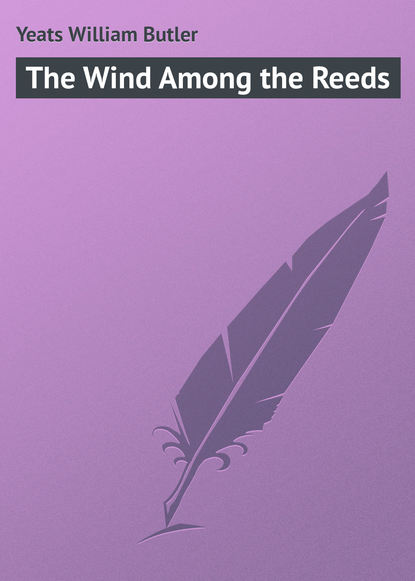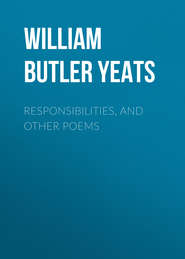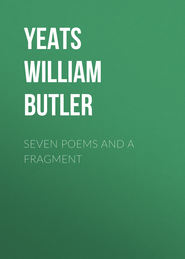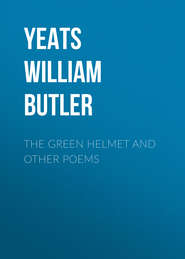По всем вопросам обращайтесь на: info@litportal.ru
(©) 2003-2024.
✖
The Wind Among the Reeds
Настройки чтения
Размер шрифта
Высота строк
Поля
We will bend down and loosen our hair over you,
That it may drop faint perfume, and be heavy with dew,
Lilies of death-pale hope, roses of passionate dream.
THE POET PLEADS WITH HIS FRIEND FOR OLD FRIENDS
Though you are in your shining days,
Voices among the crowd
And new friends busy with your praise,
Be not unkind or proud,
But think about old friends the most:
Time's bitter flood will rise,
Your beauty perish and be lost
For all eyes but these eyes.
HANRAHAN SPEAKS TO THE LOVERS OF HIS SONGS IN COMING DAYS
O, colleens, kneeling by your altar rails long hence,
When songs I wove for my beloved hide the prayer,
And smoke from this dead heart drifts through the violet air
And covers away the smoke of myrrh and frankincense;
Bend down and pray for the great sin I wove in song,
Till Maurya of the wounded heart cry a sweet cry,
And call to my beloved and me: 'No longer fly
'Amid the hovering, piteous, penitential throng.'
AEDH PLEADS WITH THE ELEMENTAL POWERS
The Powers whose name and shape no living creature knows
Have pulled the Immortal Rose;
And though the Seven Lights bowed in their dance and wept,
The Polar Dragon slept,
His heavy rings uncoiled from glimmering deep to deep:
When will he wake from sleep?
Great Powers of falling wave and wind and windy fire,
With your harmonious choir
Encircle her I love and sing her into peace,
That my old care may cease;
Unfold your flaming wings and cover out of sight
The nets of day and night.
Dim Powers of drowsy thought, let her no longer be
Like the pale cup of the sea,
When winds have gathered and sun and moon burned dim
Above its cloudy rim;
But let a gentle silence wrought with music flow
Whither her footsteps go.
AEDH WISHES HIS BELOVED WERE DEAD
Were you but lying cold and dead,
And lights were paling out of the West,
You would come hither, and bend your head,
And I would lay my head on your breast;
And you would murmur tender words,
Forgiving me, because you were dead:
Nor would you rise and hasten away,
Though you have the will of the wild birds,
But know your hair was bound and wound
About the stars and moon and sun:
O would beloved that you lay
Under the dock-leaves in the ground,
While lights were paling one by one.
AEDH WISHES FOR THE CLOTHS OF HEAVEN
Had I the heavens' embroidered cloths,
Enwrought with golden and silver light,
The blue and the dim and the dark cloths
Of night and light and the half light,
I would spread the cloths under your feet:
But I, being poor, have only my dreams;
I have spread my dreams under your feet;
Tread softly because you tread on my dreams.
MONGAN THINKS OF HIS PAST GREATNESS
I have drunk ale from the Country of the Young
And weep because I know all things now:
I have been a hazel tree and they hung
The Pilot Star and the Crooked Plough
Among my leaves in times out of mind:
I became a rush that horses tread:
I became a man, a hater of the wind,
Knowing one, out of all things, alone, that his head
Would not lie on the breast or his lips on the hair
Of the woman that he loves, until he dies;
Although the rushes and the fowl of the air
Cry of his love with their pitiful cries.
NOTES
The Hosting of the Sidhe
The powerful and wealthy called the gods of ancient Ireland the Tuatha De Danaan, or the Tribes of the goddess Danu, but the poor called them, and still sometimes call them, the Sidhe, from Aes Sidhe or Sluagh Sidhe, the people of the Faery Hills, as these words are usually explained. Sidhe is also Gaelic for wind, and certainly the Sidhe have much to do with the wind. They journey in whirling winds, the winds that were called the dance of the daughters of Herodias in the Middle Ages, Herodias doubtless taking the place of some old goddess. When the country people see the leaves whirling on the road they bless themselves, because they believe the Sidhe to be passing by. They are almost always said to wear no covering upon their heads, and to let their hair stream out; and the great among them, for they have great and simple, go much upon horseback. If any one becomes too much interested in them, and sees them over much, he loses all interest in ordinary things. I shall write a great deal elsewhere about such enchanted persons, and can give but an example or two now.
A woman near Gort, in Galway, says: 'There is a boy, now, of the Cloran's; but I wouldn't for the world let them think I spoke of him; it's two years since he came from America, and since that time he never went to Mass, or to church, or to fairs, or to market, or to stand on the cross roads, or to hurling, or to nothing. And if any one comes into the house, it's into the room he'll slip, not to see them; and as to work, he has the garden dug to bits, and the whole place smeared with cow dung; and such a crop as was never seen; and the alders all plaited till they look grand. One day he went as far as the chapel; but as soon as he got to the door he turned straight round again, as if he hadn't power to pass it. I wonder he wouldn't get the priest to read a Mass for him, or something; but the crop he has is grand, and you may know well he has some to help him.' One hears many stories of the kind; and a man whose son is believed to go out riding among them at night tells me that he is careless about everything, and lies in bed until it is late in the day. A doctor believes this boy to be mad. Those that are at times 'away,' as it is called, know all things, but are afraid to speak. A countryman at Kiltartan says, 'There was one of the Lydons – John – was away for seven years, lying in his bed, but brought away at nights, and he knew everything; and one, Kearney, up in the mountains, a cousin of his own, lost two hoggets, and came and told him, and he knew the very spot where they were, and told him, and he got them back again. But they were vexed at that, and took away the power, so that he never knew anything again, no more than another.' This wisdom is the wisdom of the fools of the Celtic stories, that was above all the wisdom of the wise. Lomna, the fool of Fiann, had so great wisdom that his head, cut from his body, was still able to sing and prophesy; and a writer in the 'Encyclopædia Britannica' writes that Tristram, in the oldest form of the tale of Tristram and Iseult, drank wisdom, and madness the shadow of wisdom, and not love, out of the magic cup.
The great of the old times are among the Tribes of Danu, and are kings and queens among them. Caolte was a companion of Fiann; and years after his death he appeared to a king in a forest, and was a flaming man, that he might lead him in the darkness. When the king asked him who he was, he said, 'I am your candlestick.' I do not remember where I have read this story, and I have, maybe, half forgotten it. Niam was a beautiful woman of the Tribes of Danu, that led Oisin to the Country of the Young, as their country is called; I have written about her in 'The Wandering of Usheen;' and he came back, at last, to bitterness and weariness.
That it may drop faint perfume, and be heavy with dew,
Lilies of death-pale hope, roses of passionate dream.
THE POET PLEADS WITH HIS FRIEND FOR OLD FRIENDS
Though you are in your shining days,
Voices among the crowd
And new friends busy with your praise,
Be not unkind or proud,
But think about old friends the most:
Time's bitter flood will rise,
Your beauty perish and be lost
For all eyes but these eyes.
HANRAHAN SPEAKS TO THE LOVERS OF HIS SONGS IN COMING DAYS
O, colleens, kneeling by your altar rails long hence,
When songs I wove for my beloved hide the prayer,
And smoke from this dead heart drifts through the violet air
And covers away the smoke of myrrh and frankincense;
Bend down and pray for the great sin I wove in song,
Till Maurya of the wounded heart cry a sweet cry,
And call to my beloved and me: 'No longer fly
'Amid the hovering, piteous, penitential throng.'
AEDH PLEADS WITH THE ELEMENTAL POWERS
The Powers whose name and shape no living creature knows
Have pulled the Immortal Rose;
And though the Seven Lights bowed in their dance and wept,
The Polar Dragon slept,
His heavy rings uncoiled from glimmering deep to deep:
When will he wake from sleep?
Great Powers of falling wave and wind and windy fire,
With your harmonious choir
Encircle her I love and sing her into peace,
That my old care may cease;
Unfold your flaming wings and cover out of sight
The nets of day and night.
Dim Powers of drowsy thought, let her no longer be
Like the pale cup of the sea,
When winds have gathered and sun and moon burned dim
Above its cloudy rim;
But let a gentle silence wrought with music flow
Whither her footsteps go.
AEDH WISHES HIS BELOVED WERE DEAD
Were you but lying cold and dead,
And lights were paling out of the West,
You would come hither, and bend your head,
And I would lay my head on your breast;
And you would murmur tender words,
Forgiving me, because you were dead:
Nor would you rise and hasten away,
Though you have the will of the wild birds,
But know your hair was bound and wound
About the stars and moon and sun:
O would beloved that you lay
Under the dock-leaves in the ground,
While lights were paling one by one.
AEDH WISHES FOR THE CLOTHS OF HEAVEN
Had I the heavens' embroidered cloths,
Enwrought with golden and silver light,
The blue and the dim and the dark cloths
Of night and light and the half light,
I would spread the cloths under your feet:
But I, being poor, have only my dreams;
I have spread my dreams under your feet;
Tread softly because you tread on my dreams.
MONGAN THINKS OF HIS PAST GREATNESS
I have drunk ale from the Country of the Young
And weep because I know all things now:
I have been a hazel tree and they hung
The Pilot Star and the Crooked Plough
Among my leaves in times out of mind:
I became a rush that horses tread:
I became a man, a hater of the wind,
Knowing one, out of all things, alone, that his head
Would not lie on the breast or his lips on the hair
Of the woman that he loves, until he dies;
Although the rushes and the fowl of the air
Cry of his love with their pitiful cries.
NOTES
The Hosting of the Sidhe
The powerful and wealthy called the gods of ancient Ireland the Tuatha De Danaan, or the Tribes of the goddess Danu, but the poor called them, and still sometimes call them, the Sidhe, from Aes Sidhe or Sluagh Sidhe, the people of the Faery Hills, as these words are usually explained. Sidhe is also Gaelic for wind, and certainly the Sidhe have much to do with the wind. They journey in whirling winds, the winds that were called the dance of the daughters of Herodias in the Middle Ages, Herodias doubtless taking the place of some old goddess. When the country people see the leaves whirling on the road they bless themselves, because they believe the Sidhe to be passing by. They are almost always said to wear no covering upon their heads, and to let their hair stream out; and the great among them, for they have great and simple, go much upon horseback. If any one becomes too much interested in them, and sees them over much, he loses all interest in ordinary things. I shall write a great deal elsewhere about such enchanted persons, and can give but an example or two now.
A woman near Gort, in Galway, says: 'There is a boy, now, of the Cloran's; but I wouldn't for the world let them think I spoke of him; it's two years since he came from America, and since that time he never went to Mass, or to church, or to fairs, or to market, or to stand on the cross roads, or to hurling, or to nothing. And if any one comes into the house, it's into the room he'll slip, not to see them; and as to work, he has the garden dug to bits, and the whole place smeared with cow dung; and such a crop as was never seen; and the alders all plaited till they look grand. One day he went as far as the chapel; but as soon as he got to the door he turned straight round again, as if he hadn't power to pass it. I wonder he wouldn't get the priest to read a Mass for him, or something; but the crop he has is grand, and you may know well he has some to help him.' One hears many stories of the kind; and a man whose son is believed to go out riding among them at night tells me that he is careless about everything, and lies in bed until it is late in the day. A doctor believes this boy to be mad. Those that are at times 'away,' as it is called, know all things, but are afraid to speak. A countryman at Kiltartan says, 'There was one of the Lydons – John – was away for seven years, lying in his bed, but brought away at nights, and he knew everything; and one, Kearney, up in the mountains, a cousin of his own, lost two hoggets, and came and told him, and he knew the very spot where they were, and told him, and he got them back again. But they were vexed at that, and took away the power, so that he never knew anything again, no more than another.' This wisdom is the wisdom of the fools of the Celtic stories, that was above all the wisdom of the wise. Lomna, the fool of Fiann, had so great wisdom that his head, cut from his body, was still able to sing and prophesy; and a writer in the 'Encyclopædia Britannica' writes that Tristram, in the oldest form of the tale of Tristram and Iseult, drank wisdom, and madness the shadow of wisdom, and not love, out of the magic cup.
The great of the old times are among the Tribes of Danu, and are kings and queens among them. Caolte was a companion of Fiann; and years after his death he appeared to a king in a forest, and was a flaming man, that he might lead him in the darkness. When the king asked him who he was, he said, 'I am your candlestick.' I do not remember where I have read this story, and I have, maybe, half forgotten it. Niam was a beautiful woman of the Tribes of Danu, that led Oisin to the Country of the Young, as their country is called; I have written about her in 'The Wandering of Usheen;' and he came back, at last, to bitterness and weariness.











